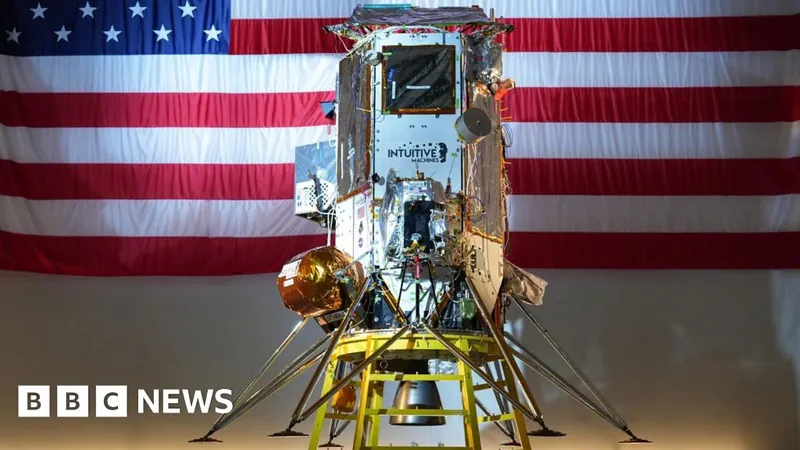
Revolutionizing Data: The Race to Launch Orbital Data Centres on the Moon
2025-04-09
Author: John Tan
Stellar Ambitions: Data Centres in Space
Imagine a future where data centres orbit the Earth or even sit atop the lunar surface! This isn't sci-fi; it's a vision championed by Stephen Eisele, President of Lonestar Data Holdings, who's eager to make lunar data storage a reality. 'The way we see it is that by putting the data centre in space, you're really offering unparalleled security,' he notes confidently.
Lunar Launch Success
Recently, Lonestar achieved a monumental milestone by testing a miniature data centre—no bigger than a hardback book—on the Athena Lunar Lander, which launched from a SpaceX rocket. This isn't just a proof of concept; it heralds a new era in data processing.
Why the Moon?
Why is the Moon the next frontier for data centres? For starters, these celestial facilities could harness the unlimited solar energy available, offering a reliable power source free from the environmental complaints that often accompany terrestrial data centres. With the soaring demand for data driven by AI and digital transformation, finding suitable real estate on Earth has become a challenge. McKinsey predicts a staggering 19% to 22% annual growth in data centre demand by 2030.
Space Advantage: Faster and Greener
With fewer regulations and complaints, space-based data centres can more easily meet the urgent needs of modern technology. They could also facilitate space-to-space data transfers, bypassing the lag associated with ground systems. A European Commission study presented by Thales Alenia Space outlined plans for 13 satellites capable of processing data like a sizeable ground data centre but without going through earthly limitations.
Hurdles and Hope
However, venturing into space brings significant challenges. Dr. Domenico Vicinanza from Anglia Ruskin University highlights that the costs of launching hardware into orbit are astronomical, not to mention the complexities of ensuring proper cooling and safety for the equipment. The harsh conditions of space and the ever-present threat of space debris complicate matters further.
Breaking Down Barriers
Despite these challenges, companies like Lonestar are unfazed. They aim for a small data centre to orbit the Moon by 2027, while other firms, like Starcloud, are racing to establish satellite data centres even sooner. Not only will these facilities offer heightened security by keeping data separate from terrestrial networks, but they also provide compliance with data sovereignty laws—treating data servers as legal entities in space.
The Future is Bright (and in Space!)
As Eisele puts it, 'It's like having the vaults at the back of the bank.' The distance from Earth adds an additional security layer against breaches. With excitement buzzing around celestial data storage, businesses like Florida and the Isle of Man are already on board, eager to secure their futures in the cosmos.

 Brasil (PT)
Brasil (PT)
 Canada (EN)
Canada (EN)
 Chile (ES)
Chile (ES)
 Česko (CS)
Česko (CS)
 대한민국 (KO)
대한민국 (KO)
 España (ES)
España (ES)
 France (FR)
France (FR)
 Hong Kong (EN)
Hong Kong (EN)
 Italia (IT)
Italia (IT)
 日本 (JA)
日本 (JA)
 Magyarország (HU)
Magyarország (HU)
 Norge (NO)
Norge (NO)
 Polska (PL)
Polska (PL)
 Schweiz (DE)
Schweiz (DE)
 Singapore (EN)
Singapore (EN)
 Sverige (SV)
Sverige (SV)
 Suomi (FI)
Suomi (FI)
 Türkiye (TR)
Türkiye (TR)
 الإمارات العربية المتحدة (AR)
الإمارات العربية المتحدة (AR)